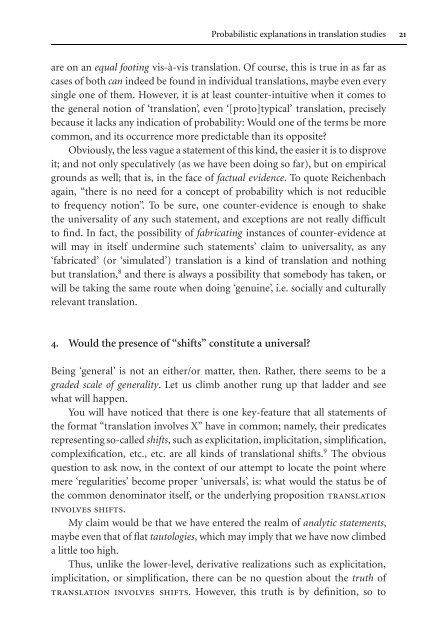Translation Universals.pdf - ymerleksi - home
Translation Universals.pdf - ymerleksi - home
Translation Universals.pdf - ymerleksi - home
You also want an ePaper? Increase the reach of your titles
YUMPU automatically turns print PDFs into web optimized ePapers that Google loves.
Probabilistic explanations in translation studies 21<br />
are on an equal footing vis-à-vis translation. Of course, this is true in as far as<br />
cases of both can indeed be found in individual translations, maybe even every<br />
single one of them. However, it is at least counter-intuitive when it comes to<br />
the general notion of ‘translation’, even ‘[proto]typical’ translation, precisely<br />
because it lacks any indication of probability: Would one of the terms be more<br />
common, and its occurrence more predictable than its opposite?<br />
Obviously, the less vague a statement of this kind, the easier it is to disprove<br />
it; and not only speculatively (as we have been doing so far), but on empirical<br />
grounds as well; that is, in the face of factual evidence. ToquoteReichenbach<br />
again, “there is no need for a concept of probability which is not reducible<br />
to frequency notion”. To be sure, one counter-evidence is enough to shake<br />
the universality of any such statement, and exceptions are not really difficult<br />
to find. In fact, the possibility of fabricating instances of counter-evidence at<br />
will may in itself undermine such statements’ claim to universality, as any<br />
‘fabricated’ (or ‘simulated’) translation is a kind of translation and nothing<br />
but translation, 8 and there is always a possibility that somebody has taken, or<br />
will be taking the same route when doing ‘genuine’, i.e. socially and culturally<br />
relevant translation.<br />
4. Would the presence of “shifts” constitute a universal?<br />
Being ‘general’ is not an either/or matter, then. Rather, there seems to be a<br />
graded scale of generality. Let us climb another rung up that ladder and see<br />
what will happen.<br />
You will have noticed that there is one key-feature that all statements of<br />
the format “translation involves X” have in common; namely, their predicates<br />
representing so-called shifts, such as explicitation, implicitation, simplification,<br />
complexification, etc., etc. are all kinds of translational shifts. 9 The obvious<br />
question to ask now, in the context of our attempt to locate the point where<br />
mere ‘regularities’ become proper ‘universals’, is: what would the status be of<br />
the common denominator itself, or the underlying proposition translation<br />
involves shifts.<br />
My claim would be that we have entered the realm of analytic statements,<br />
maybe even that of flat tautologies, which may imply that we have now climbed<br />
a little too high.<br />
Thus, unlike the lower-level, derivative realizations such as explicitation,<br />
implicitation, or simplification, there can be no question about the truth of<br />
translation involves shifts. However, this truth is by definition, so to
















